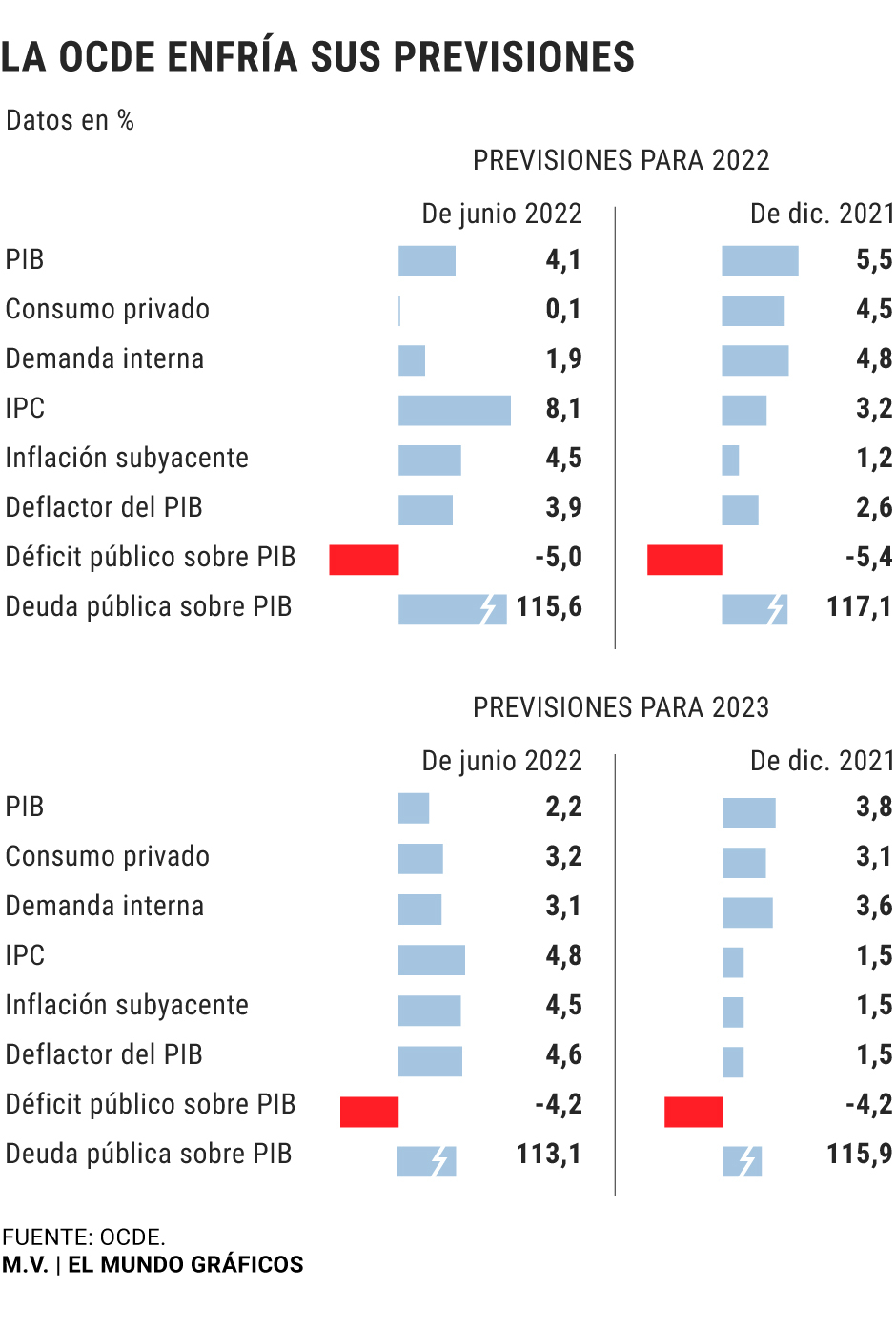The OECD lowers its growth forecast for Spain by 1.4 points and raises its average inflation forecast by 5 points
Inflation in Spain was going to drop to around 2% in 2023,
which was going to place the country as one of the European Union states with the lowest price increases next year.
This was predicted by the Government, the European Commission, the IMF and the Bank of Spain, but that was
before the EU approved economic sanctions
against Russia.
Now, the
OECD
warns that
the CPI will grow an average of 4.9% next year
, triple what was forecast in December and the highest rise among the EU powers.
"
The war in Ukraine has dispelled hopes
that the
inflationary surge
experienced by much of the world economy in 2021 and early 2022
will abate rapidly
. The additional boost to food and energy prices and the worsening of problems of the supply chain imply that
consumer price
inflation
will peak later
and
at higher levels
than expected," warns the OECD in its latest economic projections report, published this Wednesday.
Prices will rise again in Spain by another 4.9%
next year, an increase that will be added to the one already registered this year -8.1% on average- and that will further impoverish families and make companies less competitive .
In other countries the increase in prices will be somewhat more moderate: in
France
they will rise by
4.5%
;
in
Germany
,
4.7%
;
in
Italy
,
3.8%
;
in
Portugal
,
4%
;
in
Greece
,
3.4%
, and on average in the
Eurozone
as a whole,
4.6%
.
The new OECD inflation forecast triples
what they had in December, when they expected inflation to rise by
1.5% next year in Spain,
and doubles what the rest of the organizations had presented for Spain: the
European Commission
forecast in May that inflation would drop to
1.8%
in 2023;
the
Bank of Spain
in its macroeconomic projections placed it at
2%
and the
IMF
had even placed it at
1.3%.
Other study services such as
Funcas
had projected an average price rise of
3.6%
for next year;
CaixaBank Research
was betting on
2.2%
;
the
Chamber of Commerce
pointed to
3%;
CEOE
, at
2.1%
;
and
Santander
, at
2.5%
.
All very far from the new OECD forecast.
This estimate also clashes head-on with the
official figures
presented by the Government in its 2022-2025 Stability Program, since while the Executive foresaw that the
GDP deflator
(an indicator used to measure the evolution of prices that takes into account all products of the economy and not only those of the consumer basket, such as the CPI)
would rise by 2%
in 2023, the
OECD
itself forecasts that the
deflator
will rise by
4.6%
next year.
For this year, the Government expected the deflator to rise by
4%
on average, a figure in which it coincides with the OECD, which puts it at
3.9%.
The problem of expectations
Inflation
is
a word that appears
860 times
in the 231-page document presented yesterday by this institution and it is its main concern, since it is precisely what will cause a
collapse in domestic demand and consumption
in many countries and a sharp slowdown in increase.
In
Spain
, private consumption will only grow one tenth this year, which has led the OECD to lower
GDP
growth to
4.1%
, compared to the 5.5% it was considering in December.
"
The global economy will weaken sharply.
We estimate global growth to be
3%
in 2022 - up from 4% we projected last December - and 2% in 2023.
Inflation projections now stand at almost 9%
in OECD countries in 2022,
double
than what we previously projected.
High inflation around the world is eroding real disposable income and household living standards, and in turn consumption.
The uncertainty deters business investment and threatens to curb supply for years to come.
At the same time, China's covid-zero policy continues to weigh on global prospects, dampening domestic growth and disrupting global supply chains."
Although they admit that inflation will help reduce the weight of the debt -and also of the public debt-, it also
erodes income, savings and purchasing power
, and can affect the profits of companies and the
ability to invest and create job.
“
Inflation
is a burden that
needs to be shared fairly
between people and businesses, between profits and wages. Governments also have a role to play by targeting support for the most vulnerable to offset rising food inflation. and energy", they claim.
The
OECD
has been the
first body
to forecast such high inflation for next year, which poses a risk in the face of agents'
expectations
, since if the idea that prices will rise sharply next year is consolidated that will condition the behavior of individuals and companies.
To avoid
second-round effects
, expectations are key, since if a
company
assumes that next year the price of its intermediate goods will rise again by an average of 5%, it will have
more incentives to increase final prices
than if it thinks that prices will moderate.
The same thing happens in the labor market: if an
employee
believes that next year prices will continue to rise, he will have
more reasons to ask for a salary increase.
The main reason is in the war and, more specifically, in the
sanctions
approved against Russia: "although alternative supplies can be found on world markets at higher prices and shortages are avoided, as assumed in the baseline projections
, The embargo is expected to push up inflation
and weaken growth, especially in
Europe
."
They further warn that "
upcoming
EU embargoes on
coal
and
seaborne oil imports
from Russia are likely to drive
global energy
prices higher over the next year, keeping
headline inflation higher for more time".
Conforms to The Trust Project criteria
Know more
Russia
Petroleum
GDP
Ukraine
IMF
European Comission
European Union

